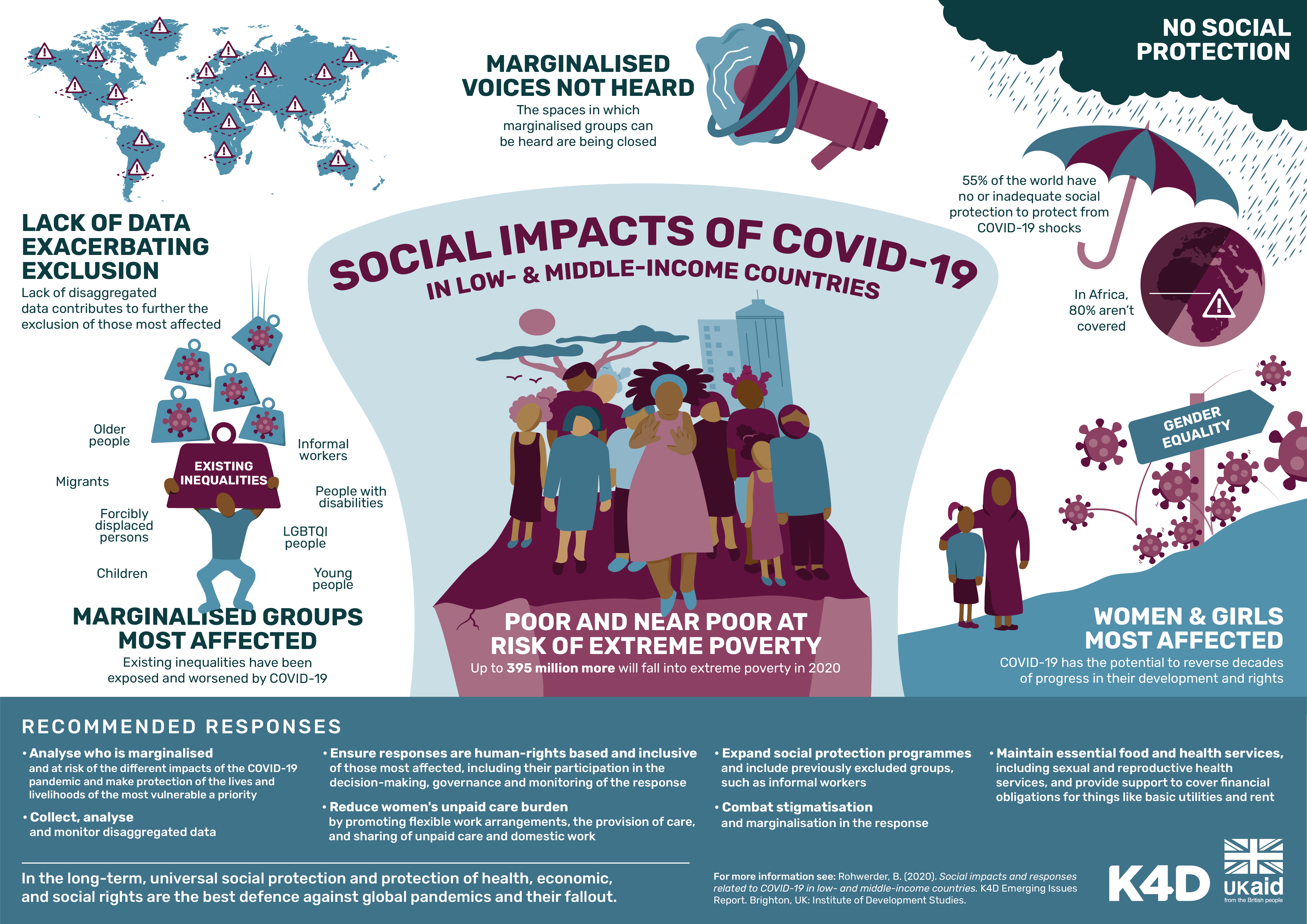The Covid-19 pandemic and responses to it have triggered a global crisis that extends beyond health impacts to all aspects of life. The pandemic poses a threat to sustainable development and implementation of the UN Sustainable Development Goals. The impacts of the crisis are harshest for those groups who were already marginalised and excluded and pre-existing inequalities are being exacerbated and deepened.

A new report, Social impacts and responses related to Covid-19 in low- and middle-income countries, prepared for the Social Development Cadre of the Foreign, Commonwealth and Development Office (FCDO), draws on the available literature, research and evidence on the emerging social impacts of the Covid-19 pandemic in low- and middle-income countries and considerations around preparedness, response/mitigation, resilience and recovery measures taken or proposed in response. Key messages from the report include:
Millions more people will fall into extreme poverty
The poor and the near poor have little ability to withstand the economic shock of Covid-19. Many of those who escaped extreme poverty in recent years are still vulnerable to falling back into it. Poor people and people living very close to the poverty line in urban and rural areas are disproportionally affected by economic consequences of the pandemic as the jobs they work in/their livelihoods are more likely to be lost and they have little recourse to social protection. Estimates suggest that between 71 million and 395 million more people will fall into extreme poverty, most of whom are in Sub-Saharan Africa. The number of people facing acute food insecurity could double to more than 260 million in 2020.
Economic shock of Covid-19 compounded by widespread lack of access to social protection
Lack of access to social protection contributes to people’s vulnerabilities to the shocks posed by Covid-19. Around 55% of the world’s population have no or inadequate social protection, especially in Africa, where 80% aren’t covered. Covid-19 has exposed serious gaps in social protection systems, especially in relation to access for informal sector workers, part-time workers, temporary workers, and self-employed workers. The social protection response to Covid-19 has been uneven, with Africa having the lowest levels of coverage at 2% for cash and 5% for cash and in-kind measures combined.
Marginalised groups most affected and existing inequalities deepened
Existing inequalities have been exposed and worsened, with those already marginalised and vulnerable the most affected– including people with disabilities, older people, children from poor families and/or marginalised and excluded groups, young people, informal workers, migrants, forcibly displaced persons, racial and ethnic minorities, indigenous peoples, and LGBTQI+ people. They are more likely lose their livelihoods as they work in sectors most affected by Covid-19 and have limited or no access to social protection, face increased barriers to accessing health care and education, as well as increased stigmatisation, discrimination and human rights abuses against them.
Covid-19 impacts have the potential to reverse decades of gender equality progress
Women and girls are amongst those most affected by the impact of the Covid-19 pandemic and it has the potential to reverse decades of progress in their development and rights. They are more likely to work in sectors most affected, face an increased care burden, and have less access to online learning and are more likely to drop out of school. They are experiencing big increases in gender-based violence (including increased cases of female genital mutilation and child marriage) and reduced access to sexual and reproductive health services, leading to millions more unintended pregnancies.
Closing civic space, human rights violations, and stigmatisation
The space in which marginalised and excluded groups can make their voices heard and hold their government’s accountable is being closed and some emergency laws and responses to the pandemic have violated their human rights and caused stigmatisation, and in some cases deliberate marginalisation of certain groups.
Absence of inclusive data and response
Lack of disaggregated data and meaningful participation, representation, and inclusion of affected populations in Covid-19 response decision-making is contributing to the further exclusion and marginalisation of the groups most affected.
Ensuring an inclusive response
Responses to the pandemic should:
- analyse who is marginalised and at risk of the different impacts and make protection of the lives and livelihoods of the most vulnerable a priority;
- collect, analyse and monitor disaggregated data;
- ensure responses are human-rights based and inclusive of those most affected, including their representation in the decision-making, governance and monitoring of the response;
- combat stigmatisation and marginalisation in the response;
- expand social protection programmes and include previously excluded groups, such as informal workers;
- maintain essential food and health services, including sexual and reproductive health services, and provide support to cover financial obligations for things like basic utilities and rent;
- promote flexible work arrangements, the provision of care, and the sharing of unpaid care and domestic work, to reduce women’s unpaid care burden.
In the long-term, universal social protection and protection of health, economic, and social rights are critical in mitigating the impacts of global pandemics and their fallout.